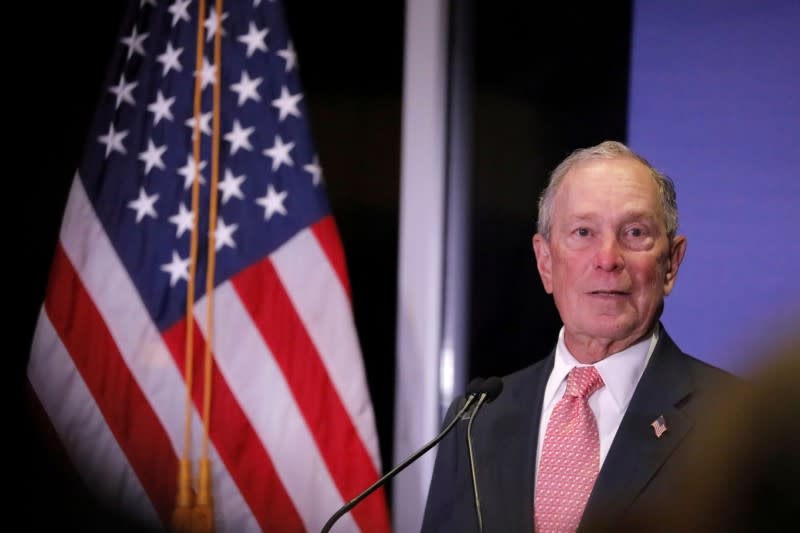Democrat Bloomberg vows to narrow wealth gap for black Americans
By Jason Lange
(Reuters) - Democratic presidential candidate Michael Bloomberg on Sunday pledged to narrow the wealth gap between black and white Americans by boosting black ownership of homes and businesses and investing in poor neighborhoods.
Bloomberg, a late entry to the Democratic nomination contest, is rising in public opinion polls as he uses his vast personal fortune to spend heavily on advertising nationwide.
But the billionaire former mayor of New York trails frontrunners Bernie Sanders, Joe Biden and Elizabeth Warren nationally and among African Americans, who make up about a quarter of Democratic voters in the contest to take on Republican President Donald Trump in the November election.
Speaking in Tulsa, Oklahoma, the day before a holiday honoring slain civil rights leader Martin Luther King Jr., Bloomberg said his plans would help one million black Americans become homeowners over 10 years, while also boosting the number of black-owned businesses. He pledged a $70 billion program to fight poverty in 100 disadvantaged neighborhoods.
"You don't reverse hundreds of years of theft and exploitation only with some modern-day attempt to legislate equal rights," Bloomberg said.
He called his plan the "Greenwood Initiative," named after a prosperous black district in Tulsa that was razed in 1921 by a white mob which killed many dozens - and possibly hundreds - of blacks.
The United States stands out among developed countries for its large wealth gaps and its relatively recent history of pervasive slavery, which underpinned its southern economy until 1865.
According to researchers at the Federal Reserve https://www.clevelandfed.org/newsroom-and-events/publications/economic-commentary/2019-economic-commentaries/ec-201903-what-is-behind-the-persistence-of-the-racial-wealth-gap.aspx#D2, white American households on average had over six times the wealth of black households in 2016, a gap largely constant since 1962 despite legal efforts to ban discrimination.
The Bloomberg campaign said his plan would help blacks with mortgage downpayment assistance and he pledged to fight discrimination with bias training for police, teachers and federal contractors.
Bloomberg has faced criticism in black communities over his support of a controversial policing policy that ensnared disproportionate numbers of blacks and Latinos when he was New York's mayor. The former Republican apologized for the policy only a few days before announcing his candidacy in November.
While the timing of the apology looked bad, Bloomberg's pledge to fight the racial wealth gap could still help him win votes, said Democratic strategist Douglas Wilson in Charlotte, North Carolina.
"It's a very good move on his part," said Wilson.
Bloomberg is not campaigning in the first four states to vote in the nomination process, including Iowa on Feb. 3, and hopes to make up ground on the "Super Tuesday" March 3 contests that include racially diverse Texas, California and North Carolina.
A Reuters/Ipsos poll conducted Jan. 15-16 showed 9% of Democrats and independents backed Bloomberg in the nomination contest, up from 5% in early December. He trailed Sanders, who led with 20%, Biden who had 19% and Warren who had 12%.
Biden has the most African American support with 23%, according to Reuters/Ipsos polling in the month through mid-January, compared to 17% for Sanders, 9% for Warren and 7% for Bloomberg.
(Reporting by Jason Lange in Washington; Editing by Andrea Ricci)

 Yahoo Finance
Yahoo Finance 

